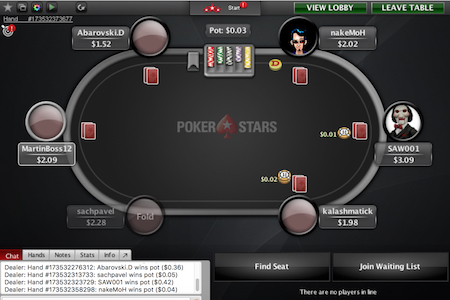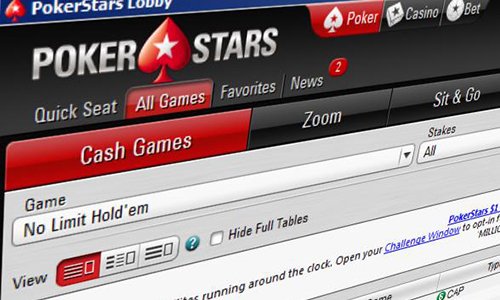PokerStars Trials Reduced Action Time at Select Micro-Stakes Tables
With the way things are trending in poker, I have in a my mind a future where I as I walk through the park, my grandchildren running ahead of me playing psychokinetic tag with their holographic brain implants, I spy two people playing poker at a small table under a tree. The hole cards are dealt and one of the children makes a bet, slamming his hand onto a small box perched on the edge of the table. His opponent calls and SLAM! Palm on the box again. The flop is dealt, one player checks. SLAM! The other player bets. SLAM!
As I approach, I notice that the box that is taking a beating is an old chess clock. It has been a long time since I played poker, but I remember it had evolved from a game of complex decisions that often required deep thought to a game of instant moves, governed by the clock. The chess clock the men are using allows them to monitor their total decision-making time. Poker is now a speed game, less a game of calculation than it is of instinct.
But that’s a long way off. For now, we will just watch the world’s largest online poker room, PokerStars, experiment with some new rules at cash game tables in an effort to quicken the pace of the game. In post on the site’s corporate blog last week, PokerStars Ring Games Manager Dan Price, announced a trial of new “Time to Act” settings on a limited number of tables starting today, Monday, July 31st.
Price explained:
One of the most frustrating aspects of playing cash games can be making a disciplined fold and then having to wait for your opposition to play out a painfully slow hand before you get to make your next decision. Unsurprisingly one of the most common complaints we receive is about opponents taking forever over the simplest decisions… even going into their time-bank just to fold pre-flop!
With player experience in mind we simulated a variety of different Time to Act settings and have come up with numbers which will still allow plenty of time for the key decisions that require true brain power and thinking time, but will also significantly speed up the game.
As such, in only the $0.01/$0.02 No-Limit Hold’em and Pot-Limit Omaha ring games for now, the time which players have to make their decisions has been reduced. Currently at all other cash game tables, when the action is pre-flop and a player is not facing a raise (meaning, all they have to do is call the big blind, fold, or – if they are in the big blind – check), the player has 18 seconds to input an action. Post-flop and pre-flop when facing a raise (and, presumably a weightier decision), a player has 25 seconds with which to act.

Image credit: PokerStars Blog
At the micro-stakes tables where the Time to Act trial is taking place, the pre-flop time when not facing a raise has been cut to 12 seconds and the post-flop/pre-flop facing a raise time has been slashed by 40 percent, down to 15 seconds.
Players do still have a time bank, that store of time that can be dipped into if a player needs some extra time to ponder a move. The time bank has not changed. Players start out with 30 seconds of backup time and then receive an additional 10 seconds for every 50 hands played, up to a maximum of 600 total seconds (can you imagine someone tanking for 10 minutes in an online poker hand?). This time bank starts automatically for a player who has money invested in a pot and goes over his regularly allotted time. If a player does not have money invested in the pot (say, the player is in middle position in a No-Limit Hold’em full-ring game pre-flop), the player’s hand is automatically folded and the player is forced to sit out.
“We will monitor the impact that these changes have on the games and will, as always, listen closely to the feedback of our players,” wrote Price. “We seek to keep our games fun, exciting and engaging for all players but appreciate that there may be some players who are upset with the new pace of the game. However, we are confident that this is a big step in the right direction for the vast majority of players.”
Only the $0.01/$0.02 No-Limit Hold’em and Pot-Limit Omaha ring games are affected by the changes for the moment. No other cash game tables are involved in the Time to Act testing, nor are tournaments or Zoom Poker games.



















COMMENTS